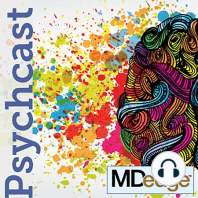10 min listen
Prepping patients for psych medication disruptions with Dr. Cam Ritchie
FromPsychcast
ratings:
Length:
32 minutes
Released:
Jul 24, 2019
Format:
Podcast episode
Description
Show Notes Elspeth Cameron Ritchie, MD, MPH, talks with Lorenzo Norris, MD, host of the MDedge Psychcast and editor in chief of MDedge Psychiatry, about averting disruptions in psychiatric medications after short- and long-term disasters. Dr. Ritchie is a psychiatrist who works in Washington. Show Notes by Jacqueline Posada, MD, 4th-year resident in the department of psychiatry & behavioral sciences at George Washington University, Washington. Later, in the “Dr. RK” segment, Renee Kohanski, MD, discusses the potential impact of pharmacogenomics on the practice of psychiatry. Dr. Kohanski, a member of the MDedge Psychiatry Editorial Advisory Board, is a psychiatrist in private practice in Mystic, Conn. Dr. Ritchie and disaster psychiatry She entered disaster psychiatry through her many years as a military psychiatrist. She had to think about how to plan and treat psychiatric emergencies during deployments to an austere environment, such as Somalia and Iraq. She was on active duty during Sept. 11, 2001, and helped coordinate the disaster response during that period and then completed a fellowship in disaster psychiatry at the Uniformed Services University in Bethesda, Md. Ritchie says that the field has changed immensely, from the way in which it once handled debriefings to the current use of psychological first aid. Yet, she thinks that psychiatric medications are a neglected area of planning. Minor, major disasters can cause disruptions in psychiatric medications Access/continuity of psychiatric medications is overlooked in planning. Disruption in psychotropic medications will affect many populations, including people with serious mental illness (SMI), first responders, and patients dependent on controlled substances such as methadone, buprenorphine and naloxone, and benzodiazepines. Especially for those with SMI in a disaster that creates increased stress, the absence of medications can have longer negative consequences, such as changes in behavior as hospitalizations or that may lead to contact with the legal system. Plans need to be made in advance with patients to prevent disruption in medications. Small disasters could include a weather event, such as a snow or rainstorm. These can create barriers to medication at the basic level, such as a lack of electricity affecting computer systems, a pharmacist cannot make it to work, etc. Larger disasters, such as hurricanes, can have effects that last months to years, such as loss of psychiatrists or lack of other infrastructure related to mental health. Population-specific planning during disasters Patients with SMI: Some might be homeless and affected by weather conditions; there often may be a robust citywide response aimed at creating a safety net for these individuals. First responders: It is essential to have medications available for sleep, such as trazodone or zolpidem, to mitigate the effects of long, stressful workdays that make it hard to “turn off” and get rest. Working professionals: Many people balance busy lives on a routine basis, so it’s important to help these patients maintain their medications and functioning. Psychiatrists should make sure that these patients have adequate supplies of medications, such as SSRIs. How can psychiatrists help to prepare? They can ensure that patients can have an adequate supply of medications in several locations in case of disaster or emergency. They can provide a 90-day supply of medication in the event of a large disaster with lasting effects. They can determine that patients have a printed up-to-date list of all their medications in case they need to change pharmacies or have medications refilled by another clinician, such as a primary care physician. Patients and doctors rely on the electronic health records for medication lists, which may fail during a disaster. They can identify at-risk patients, such as those on controlled substances (opiates and benzodiazepines), and refill any medications that, if missed
Released:
Jul 24, 2019
Format:
Podcast episode
Titles in the series (100)
Michael Gitlin: Stimulants: 10 Minutes by Psychcast
